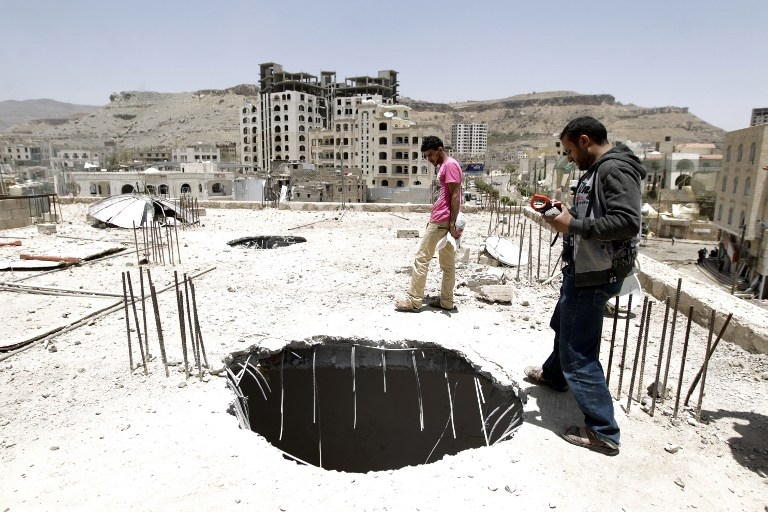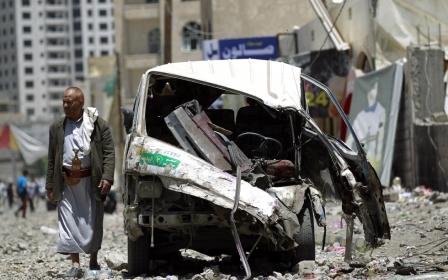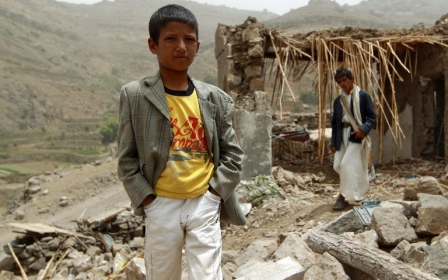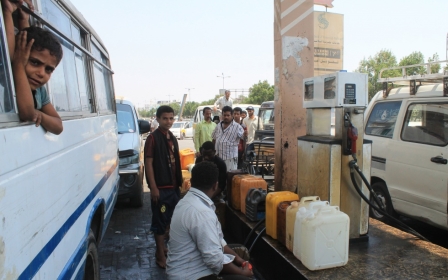Fighting rages on in Yemen despite Saudi 'peace' claims

Street battles between Houthi fighters and soldiers loyal to Yemen's exiled president raged on in Yemen's port city of Aden on Wednesday and airstrikes pounded a central city despite the end of a Saudi-led air campaign, witnesses said.
The Saudi-led coalition announced late on Tuesday that it was halting the air campaign it launched on March 26 in support of Hadi's forces.
But fighting between forces loyal to President Abb Rabbu Mansour Hadi and the Iran-allied Houthis who overran the capital last year and a string of cities across the south showed no sign of abating, and renewed coalition airstrikes hit central cities of Yemen.
Residents reported clashes in Taiz, Lahj provincial capital Huta, and the southern town of Daleh after the coalition strikes halted at midnight on Tuesday.
In Taiz, a stronghold of anti-Houthi feeling, coalition planes dropped leaflets explaining that "the aim of the coalition forces is to support the Yemeni people against the Persian expansion," Anadolu correspondents on the ground reported.
While the aerial bombing part of the operation - which has seen some 3,200 bombs dropped on Yemen in recent weeks - was previously believed to be over, there is now widespread confusion about what the latest phase of operations means.
"Bombs were dropped this morning on the 35 brigade military camp outside Taiz which the Houthis had encircled," Sadek Maktary, an activist in his twenties from Yemen's third city of Taiz, told MEE via Skype.
"People outside Yemen say the war is over but from where I am the war is ongoing," he said.
The southern port city of Aden was also struck on Wednesday, as Houthi fighters continued to engage in fierce street fighting with local armed groups known by the city's residents as the "resistance".
As the street fighting and airstrikes continued into Wednesday, the Red Cross warned that the situation throughout Yemen was becoming "catastrophic".
"[The capital] Sanaa has had no electricity for nine entire days," said Robert Mardini, who co-ordinates the aid group's work in the Middle East.
Mardini warned that food supplies were fast depleting, and that health facilities were not functioning with a total lack of vital medicines.
Defence minister released
The renewed fighting came as the Houthis reportedly released Yemen's defence minister, the brother of and another general held since late March, a source close to mediators said on Wednesday.
"Defence Minister General Mahmud al-Subaihi, General Nasser Mansour Hadi (the president's brother), and (army) General Faisal Rajab have been freed," a source told AFP.
President Hadi's brother is the intelligence deputy chief in charge of the southern provinces of Aden, Abyan and Lahj.
Observers said the trio's release appeared to be a goodwill gesture by the rebels, whose leaders have been sanctioned under a UN Security Council resolution passed this month.
Hundreds of people have died during the month of airstrikes that have hit Houthi positions as well as vital infrastructure including schools, hospitals and food depots. Thousands of Yemenis have fled to the horn of Africa, according to the World Health Organisation.
"Even if Saudi Arabia says the war is over that doesn't mean it is. The airstrikes and the naval blockade have set of rounds of fighting between factions within Yemen that could spiral out of their (Saudi Arabia's) control," Abdullah Al-Faqih, a professor of politics at Sanaa University, told Middle East Eye.
The fight for Aden, Yemen's second city on the southern coast where Hadi had based himself before fleeing to Riyadh, is unlikely to end soon, said al-Faqih, with fighters and residents there vowing to purge the city of Houthi fighters.
A former Yemeni politician who spoke on the condition of anonymity said that talks between Riyadh and the Houthis, a predominantly Zaydi Shiite movement who took part in the 2011 uprising against Ali Abdullah Saleh, were underway but had stalled.
"A key issue now is Saleh. The Saudis are convinced he's trying to make a comeback and want him to leave the country but the Houthis are resisting that," said the politician. "If a political solution is reached at this point it will be a miracle."
Houthis demand return to negotiating table
Despite pessimism expressed by some, the Houthis on Wednesday demanded a return to UN-brokered talks, just days after the resignation of the former UN envoy to Yemen, Jamal Benomar.
Benomar stepped down from the role after losing the support of the Gulf States, according to diplomats who spoke to AFP.
"We demand, after a complete end to the aggression against Yemen and the lifting of the blockade, to resume political dialogue... under the sponsorship of the United Nations," Mohammed Abdulsalam, the spokesman for the Huthi rebels, said in a statement.
In his comments, Abdulsalam also praised the United Nations' "positive efforts and its declared support for national dialogue".
His remarks came despite the UN Security Council's adoption last week of a resolution that slapped sanctions on the rebels and demanded they immediately withdraw from territory seized.
Middle East Eye propose une couverture et une analyse indépendantes et incomparables du Moyen-Orient, de l’Afrique du Nord et d’autres régions du monde. Pour en savoir plus sur la reprise de ce contenu et les frais qui s’appliquent, veuillez remplir ce formulaire [en anglais]. Pour en savoir plus sur MEE, cliquez ici [en anglais].




